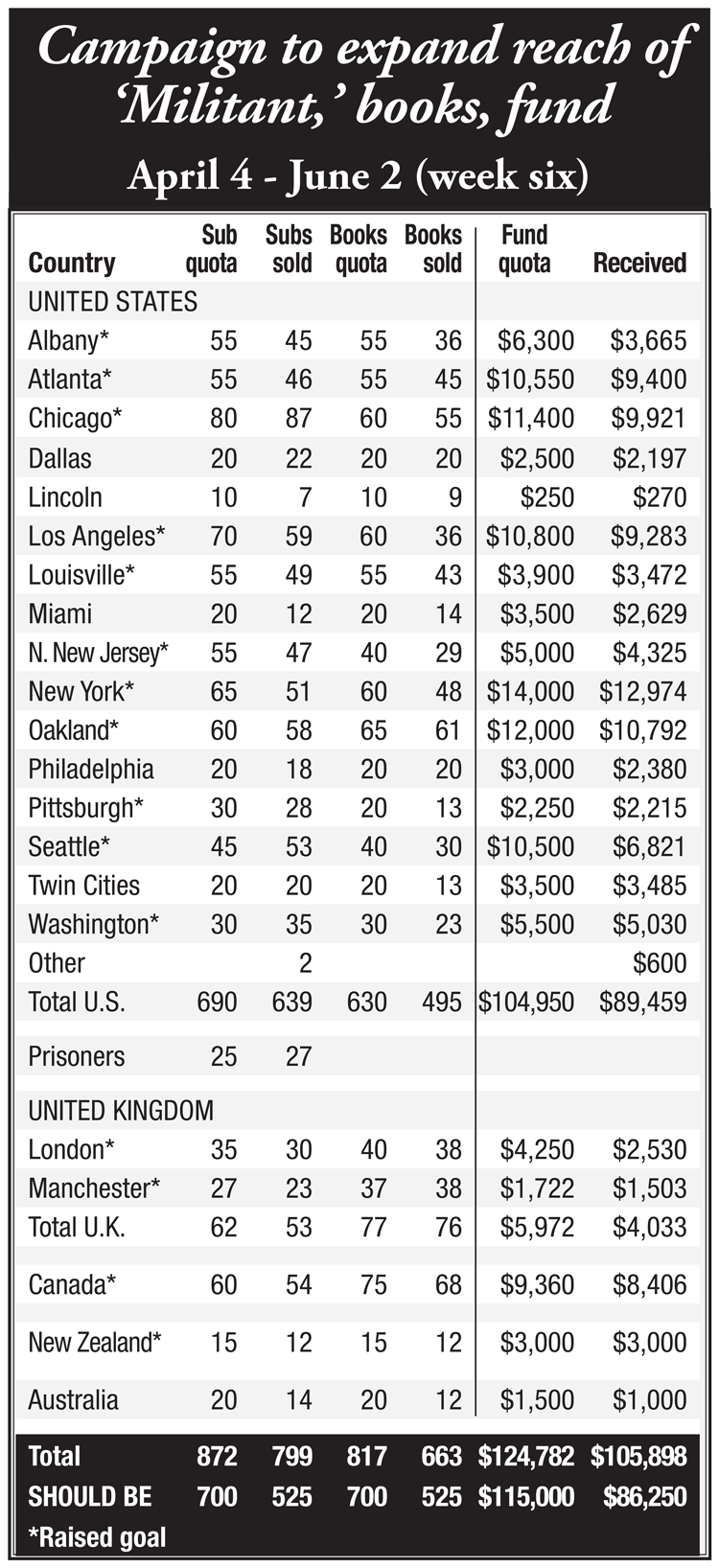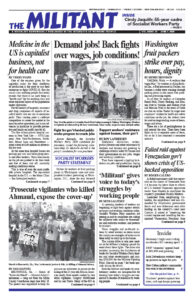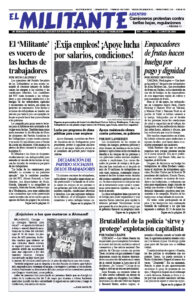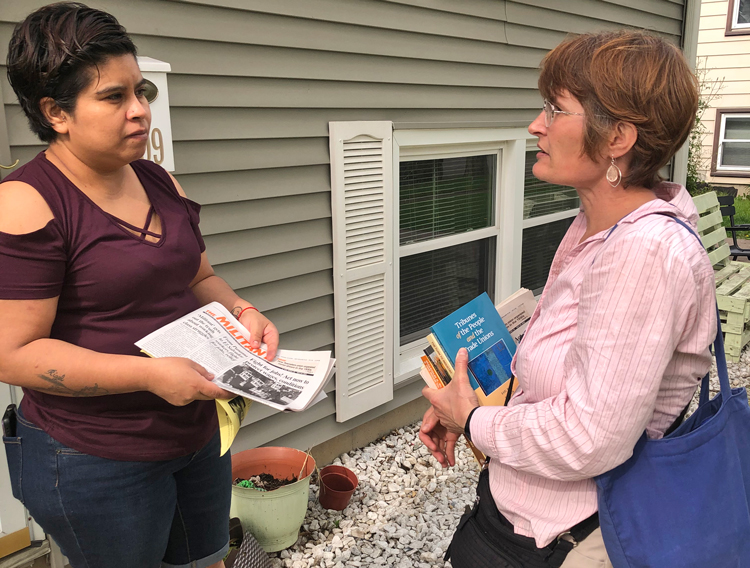As growing numbers of workers are beginning to fight back against attacks on wages and working conditions today, Socialist Workers Party members are joining in and its candidates are calling for solidarity with strikes by farmworkers and sanitation workers, and protests by truckers.
These struggles and on-the-job actions by retail workers in stores across the country are examples of what can be done today to stand up to the bosses.
The current drive to win new readers to the Militant is helping spread the word about these fights. The drive also includes increasing the distribution of books by Socialist Workers Party leaders and other revolutionists and raising $115,000 for the Militant Fighting Fund. (See ad on page 7 for book specials during the drive.)
Both the Militant and books by revolutionary leaders are indispensable for learning how today’s struggles are connected to decades of resistance by working people.
“The truckers’ fight to defend their livelihoods sets a powerful example,” Socialist Workers Party presidential candidate Alyson Kennedy told Janet Sanchez, a dispatcher from Ocala, Florida. Kennedy and her running mate, Malcolm Jarrett, had traveled to Washington, D.C., to show solidarity with truckers there protesting price gouging by freight brokers and stifling government regulations.
“Either stay home or go out and fight,” Sanchez told them. “Being afraid just paralyzes us.”
Workers control of production
“The speed of any job — like all production — has to be under workers control,” Kennedy told Felipe Velez, an independent operator from Rancho Cucamonga, California, after he described the conditions drivers face. Velez got a subscription to the socialist newsweekly.
Earlier in the week the SWP candidates spoke with Carlos Lisboa, who works in a fruit and vegetable processing plant near Bridgeton, in a farm area in southern New Jersey.
“On my job they throw tons of food away every day!” Lisboa said. “I can’t stand it.”
If working people were in control of production, Kennedy said, this would not be allowed. Millions worldwide don’t have enough to eat.
“The capitalist class will try to pit the millions of unemployed against us,” to drive down wages and boost profits at our expense, Jarrett said.
“Yes. They keep telling us, ‘if you don’t want to do this job, other people will do it,’” Lisboa said.
 “That’s why the Socialist Workers Party raises the demand for a public works program to put people to work building what we need,” Kennedy said. “If we’re stuck at home, we’re isolated and can get demoralized. Fighting for public works, as well as 30 hours work for 40 hours pay to spread around the available work, can prevent the boss class from pitting employed and unemployed against each other.”
“That’s why the Socialist Workers Party raises the demand for a public works program to put people to work building what we need,” Kennedy said. “If we’re stuck at home, we’re isolated and can get demoralized. Fighting for public works, as well as 30 hours work for 40 hours pay to spread around the available work, can prevent the boss class from pitting employed and unemployed against each other.”
Lisboa got a copy of the Militant and wants to stay in touch.
Kennedy and Jarrett spent a week in New York and New Jersey, talking to working people and small proprietors in cities and rural areas, at taxi lines and in the neighborhoods where they live.
In Goshen, New York, an hour north of New York City, the candidates spoke with former farmworkers, teachers, laid-off cooks and food servers, and retirees. The small town is in the state’s “black dirt” farming area, which includes vegetable farms, orchards, horse ranches and manufacturing plants.
Many out of work in Goshen are immigrants who don’t qualify for unemployment benefits because they don’t have government-recognized work papers. The SWP candidates got a good response from many when they said they were for an amnesty for undocumented workers, to unite the working class.
“Every day from 9 to 3 I get on the phone to try to reach the unemployment office,” Rich Ávila, a laid-off waiter, told Jarrett. But “I haven’t been able to get through,” like millions of workers around the country.
Ávila liked the article in the Militant about sanitation workers on strike for higher wages and better working conditions in New Orleans. “The economic crisis is like a cancer,” Ávila said. Bosses “are not going to stop going after us unless we make them.”
Every fight for higher wages and better working conditions is important, Jarrett noted. To put an end to the exploitation that is the basis of capitalism once and for all, working people will need to wrest political power out of the rulers’ hands and establish a government of workers and farmers. Ávila got a subscription to the Militant.
The SWP candidates spoke to working people in parking lots at two Walmarts in New Jersey, as well as some of the store workers. Seven people bought subscriptions to the Militant, along with four books.
Kennedy and Jarrett also spoke with Erika Remigio, a hospital worker in Red Bank, New Jersey, who’s active in the fight for driver’s licenses and immigrant rights. Remigio noted that many immigrant workers have even less access to health care than U.S.-born workers.
With unemployment at record highs, the bosses will try to scapegoat immigrants to divide the working class. “That’s why it’s important not to give up the fight for amnesty for undocumented workers, especially now,” Kennedy said.
Transform the unions
Naomi Craine, Socialist Workers Party candidate for U.S. Senate in Illinois, and other campaign supporters met workers at a trailer park in Rochelle, over an hour west of Chicago.

May Elmore, laid off from a warehouse, told Craine that she had been a union steward at a previous job. “I was shocked at how much of the contract was aimed at protecting the company, not the workers,” Elmore said.
Craine showed her The Turn to Industry: Forging a Proletarian Party by Socialist Workers Party National Secretary Jack Barnes and Tribunes of the People and the Trade Unions. These books explain how to build a party that acts on the fact that working people are capable of fighting to change their conditions. It joins and advances the struggles needed to transform unions into fighting organizations. This defends the interests of all workers as well as farmers and other exploited layers of the population.
Elmore got both books and a subscription to the Militant.
Members of the Communist Leagues in other countries are also taking advantage of the opportunities to extend the reach of the Militant.
Jonathan Silberman, Communist League candidate for London mayor, spoke with warehouse worker Shane Campbell in Park Wood, south of London. Silberman told Campbell what he had learned in discussions with farmworkers originally from Bulgaria and Romania about the conditions they face.
“I can see the fights in the offing, with rising unemployment and low pay,” Campbell said. “All we get on the news is virus, virus, virus. I’m interested in reading your coverage of the political questions we face.” He signed up for a subscription.


